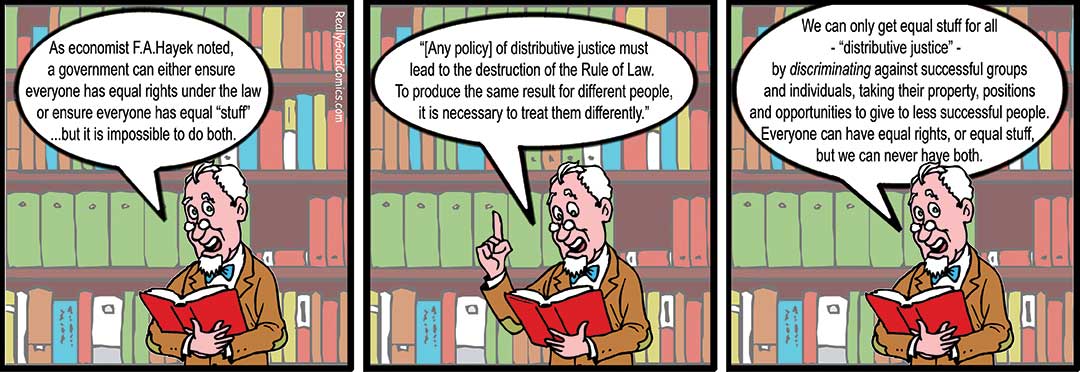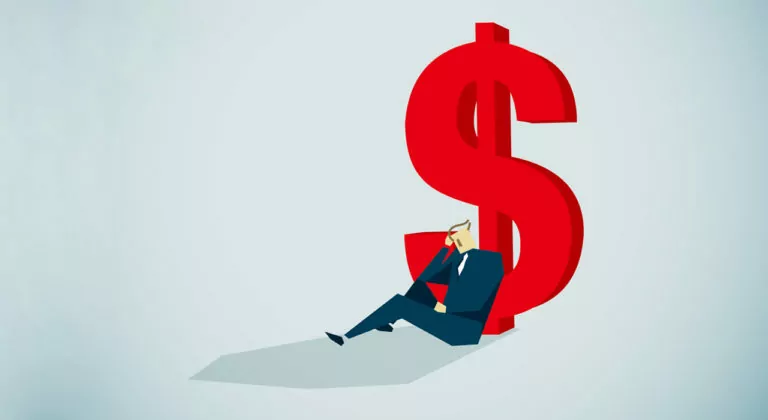A few years back my wife heard a young woman share that she had felt guilty for being able to go out to dinner with friends in Chicago. She knew her mother, still living in South Africa, wasn’t able to dine out like this.
When she later told her mother about her feelings during a phone call, her mother was having none of it. She told her daughter that gratitude, not guilt was the appropriate response to God’s blessings. The young woman was told that she should thank God for how she’d been able to immigrate to America, and she could also pray and work for a time when South Africans, and others around the world, would enjoy blessings similar to those she was experiencing now in America.
Is wealth immoral?
I remembered that story the moment I began reading about Adam Roberts, a Millennial who in his Vox article “Is wealth immoral?” expressed his sense of guilt and injustice at having inherited over a million dollars as a child of wealthy parents.
“As I got politicized around things like wealth inequality, climate change, war, and the forces connecting them, I didn’t connect it too much with my own family or history,” he wrote.
But then he came to understand things differently.
He confessed, as if they were sins, that his family had gained wealth through the oil industry, banking, and stock in companies that built things for the military. His parents had given him stock in ExxonMobil, BP, and Chevron – another reason for guilt.
As he became active as a “community organizer” in Boston, “no longer surrounded by wealthy peers,” it “felt absurd … to have access to so much when so many others didn’t.”
“As a result,” he wrote, “I got real weird about money. I’d barely spend any of it.” He’d walk instead of taking Uber. Spending of $300 a month for prescription drugs for his mother-in-law was okay, but he was conflicted about putting down $30,000 on a house or spending $6.99 for a bag of popcorn at a theater. So he offset those two by contributing $30,000 to a land trust and declining to get a soda refill.
But such things, he believes “are imperfect, individual actions.” The whole system that allows people to amass such wealth while others struggle is “immoral.” Everyone, he thinks, should have a modest first home, but nobody should have a “$20M mansion in Newport, RI,” a second home if anyone else is homeless, or a third (or fourth or fifth). Nobody should buy a new $799 sofa when he could buy a used one, and nobody should have a yacht – at all.
“Is it moral to hold any excess [emphasis original] private wealth under capitalism?” he asks – and later reveals that it’s not.
“Does it matter how that wealth was accumulated?” He offers four examples: fossil fuels, medical doctor, useful invention, or stocks.
He draws toward his conclusion by writing:
“In a system that produces a handful of people with billions of dollars while hundreds of millions of people still lack access to basic human needs like health care and affordable housing … the question isn’t what billionaires should do with ‘their’ money. It’s how to enact policies that prevent any one person from concentrating that much wealth and power in the first place.”
He recommends “taxing wealthy families like mine a whole lot more” because it’s “totally happened in the past,” it’s “part of the Green New Deal,” and it’s “widely supported.”
At the level of individual choices, he reports that he’s donated roughly a third of what he inherited to charitable causes and intends to donate another third. “For me, it feels like part of becoming more connected and alive on this planet,” he says.
Good motives; bad conclusions
How should we respond to such thinking? Certainly not by condemning Roberts’s motives. It’s refreshing to see someone born rich who cares about those who weren’t. His charitable giving is to be commended, as is his self-restraint. And, frankly, as I read his article (accompanied by brilliant illustrations that drive home his points), my heart went out to him.
Nonetheless, there are serious problems with his thinking.
Is “wealth inequality” unjust by definition? Why, then, hasn’t he already divested himself of everything he owns except what would equal the average net worth of people around the world?
How can anyone buy a used sofa – or any sofa at all – if nobody buys a new one?
What constitutes a modest first home – something typical of Corinth, Mississippi, where median home value is $105,900? Or of Boston, where Roberts lives and the median home value is five-and-a-half times as much, or Manhattan at eleven times as much, or San Francisco (tack on another hundred grand)?
Or – let’s get real now, and care about the whole world, not just wealthy America – is $1,000 a square foot, common in Boston, “modest,” or $99 (7,000 rupees) a square foot, common in Bengaluru (Bangalore), India’s “silicon valley”? Or next to nothing for the cardboard shacks in which millions of the poor of Africa, Asia, and Latin America live?
And what’s the dividing line between a moral system and an “immoral” one that allows people to amass such wealth while others struggle? Is personal net worth of $10,000 okay, but not $11,000? Or $250,000 but not $300,000? What objective standard justifies where Roberts draws the line?
And what is “excess” wealth? Consider millionaires and billionaires – the sort of persons Roberts thinks “the system” should disallow. What do millionaires and billionaires do with their “excess” wealth?
Well, they might buy stocks or bonds – providing the capital to pay workers, equip them with expensive tools that enable them to produce the food, clothing, shelter, transportation, medical care, and other benefits still other people need. They might buy a second or third house (or a yacht, or a private jet), construction of which employed workers whose wages provided food, clothing, shelter, transportation, medical care, and other benefits to themselves and their families.
Maybe they’ll just stick it in a bank account – from which the bank will make loans to companies that will employ people to make things that benefit others. About the only thing they can do with it that will be of use to nobody is hide it under the mattress. (Let me know if you run into a millionaire who does that. I’m curious to meet such an eccentric.)
It’s pretty clear that Roberts thinks there’s something particularly immoral about accumulating wealth from fossil fuels. Yet using those fossil fuels has lifted billions of people out of the poverty that breaks Roberts’s heart by providing not only energy but also plastics that prevent foods from spoiling; fertilizers that allow farmers to grow more food on less land to feed the growing human population while leaving land available for wildlife; pharmaceuticals that heal diseases; and literally thousands of other products derived from them. And when he bemoans fossil fuels’ contribution (however great or small) to climate change, does he weigh that against all those other benefits from them – plus the roughly $3.2 trillion in extra crop yields the CO2 emitted from them added to global crop yields (making food more available for the poor) from 1960 to 2012, with another $9.8 trillion expected by 2050? Medical doctors, whose method of accumulating wealth it seems Roberts favors over fossil fuels, would be severely handicapped without fossil fuel-derived medications (maybe including some his mother-in-law takes), not to mention the electricity that lights their operating rooms and powers their refrigerators to preserve their medications, their MRIs, and every other high-tech invention that enables them to restore people’s health and prolong their lives.
How many of the things that raised human life expectancy at birth from about 27 or 28 years before the Industrial Revolution to about 70 today worldwide (and 80 in developed countries) would have been developed if no inventors, innovators, or entrepreneurs could have received any more rewards for their efforts than those who dug ditches (an honorable task but not highly rewarded) or just sat on their haunches?
For some, wealth is a problem
When a rich ruler asks what he must do to inherit eternal life, Jesus tells him to obey God’s commandments – something the man says he has done from his youth up.
“One thing you still lack,” Jesus says. “Sell all that you have and distribute to the poor, and you will have treasure in heaven; and come, follow me.”
The man leaves sad, prompting Jesus’ remark, “it is easier for a camel to go through the eye of a needle than for a rich person to enter the kingdom of God” – i.e., impossible. But, He explains, “What is impossible with men is possible with God” (Luke 18:18–27).
So does that justify Roberts’s feeling guilty about his inherited wealth, and demanding that “the system” be changed to prevent anyone’s amassing “excess wealth” while others struggle?
Charity is good, and so is investment
No, for in the very next chapter, when Jesus encounters a rich tax collector who says that he will give half his goods to the poor and restore fourfold anyone he has defrauded, Jesus responds, “Today salvation has come to this house, since he also is a son of Abraham” (Luke 19:1–10).
So which is it? Must one give everything away, or half? Or is there a different point entirely – wealth takes the place of God for some people, and must be given away entirely, but not for others.
After that encounter, Jesus tells a parable about a nobleman (who represents God) who entrusts money to each of ten servants and instructs them to engage in business until he returns. On his return, the servants report their performance. The first has multiplied the investment ten times, the second five times. He rewards them proportionately.
The third servant says, “Lord, here is your mina [about $470 today], which I kept laid away in a handkerchief; for I was afraid of you, because you are a severe man. You take what you did not deposit, and reap what you did not sow.”
The nobleman, ignoring the obvious lie that he was reaping where had not sown, responds, “I will condemn you with your own words, you wicked servant! You knew that I was a severe man, taking what I did not deposit and reaping what I did not sow? Why then did you not put my money in the bank, and at my coming I might have collected it with interest?” Then he instructs others to take the money from him and give it to the first servant.
“Lord,” they protest, “he has ten minas!”
And the master responds, “I tell you that to everyone who has, more will be given, but from the one who has not, even what he has will be taken away” (Luke 19:11–27).
God condemns injustice, not wealth
The Bible has much to say about the need to protect the poor from oppression and to give charitably to help those who cannot help themselves. But nowhere does it condemn wealth. Indeed, some of the most important of God’s people were wealthy – Job, Abraham, Isaac, Jacob, Joseph, David, Solomon, Joseph of Arimathea, and wealthy women who provided for Jesus and His disciples.
The Bible condemns greed, selfishness, and injustice – but it never equates injustice with inequality.
Adam Roberts’s confusion is sad, for it means he encourages not only envy and resentment toward many whom God has blessed but also false guilt on the part of many, including himself, who are blessed.
By all means, whether you consider yourself rich or middle class or poor, give to the poor, and work to protect the poor from injustice. But don’t condemn all inequality as injustice, and don’t feel guilty for the gifts God has given you.
Calvin Beisner, Ph.D., Founder and National Spokesman of The Cornwall Alliance for the Stewardship of Creation and a former professor of historical theology and social ethics at Knox Theological Seminary, is author of Social Justice vs. Biblical Justice: How Good Intentions Undermine Justice and Gospel.
Questions to consider
- How does God’s “equality” as found in James 2:1-4, and Lev. 19:15 differ with the sort of equality that Adam Roberts wants the government to bring in? How does equal treatment under the law differ from being made equal by the law? (See the comic below).
- Roberts feels guilty for two different reasons: 1) for being wealthy, and 2) for how that wealth was garnered. As Christians, which of those two could be a legitimate concern, and which is not? Why?
- Each time money is exchanged for merchandise both parties become “wealthier.” When I pay $5 for a book it’s because that book is worth more than $5 to me and the merchant gives me the book because the $5 is worth more than the book to him (or else neither of us would make the trade). Amazingly both of us came off the better for the trade. Thus, money gained via legitimate means (piracy and money laundering are both out) represents good that has been done and wealth that has been increased. How should that understanding color our impressions of billionaires and millionaires? How much “good already accomplished” does their wealth represent?
- The 10th Commandment (Ex. 20:17) says we’re not to covet our neighbor’s stuff. Is it still coveting if we support a political party that has plans for our uber-rich neighbor’s wealth? Explain.
- Lord Acton’s most memorable quote “Power tends to corrupt, and absolute power corrupts absolutely” is based on a biblical understanding of Man’s fallen nature. Is this adage a good reason to want to diminish the wealth – and thus the power – of the very wealthy? Or does the 10th Commandment apply even to their power?
- In Luke 12:48 we read, “…from the one who has been entrusted with much, much more will be asked.” Is this passage a good justification for higher taxes on the rich? Is this God speaking to government about what the wealthy need to do, or God speaking to the wealthy about what the wealthy need to do?












